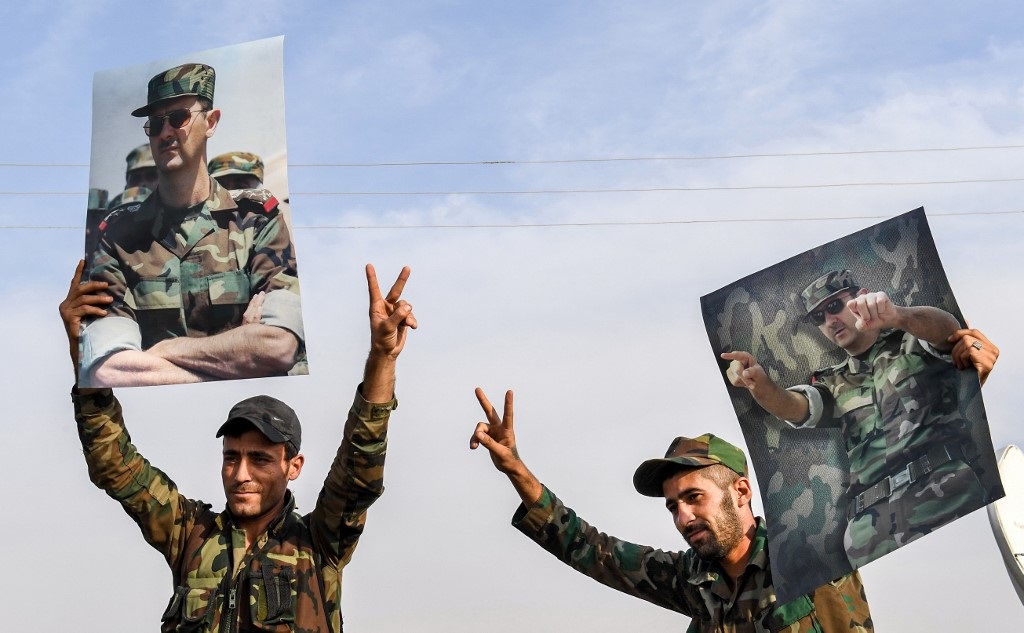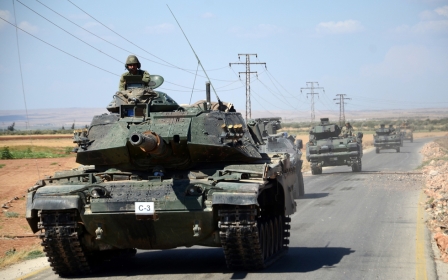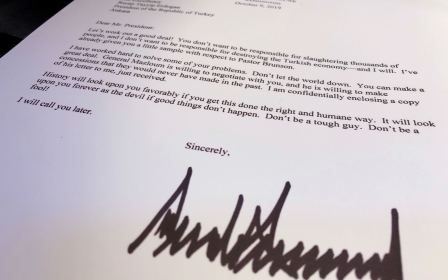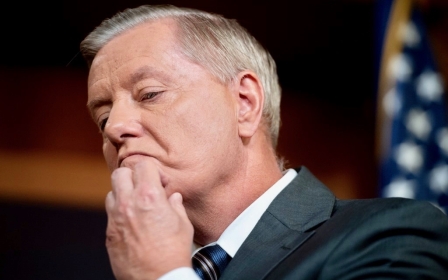Turned away at the Iraqi border, displaced Syrians resort to smugglers
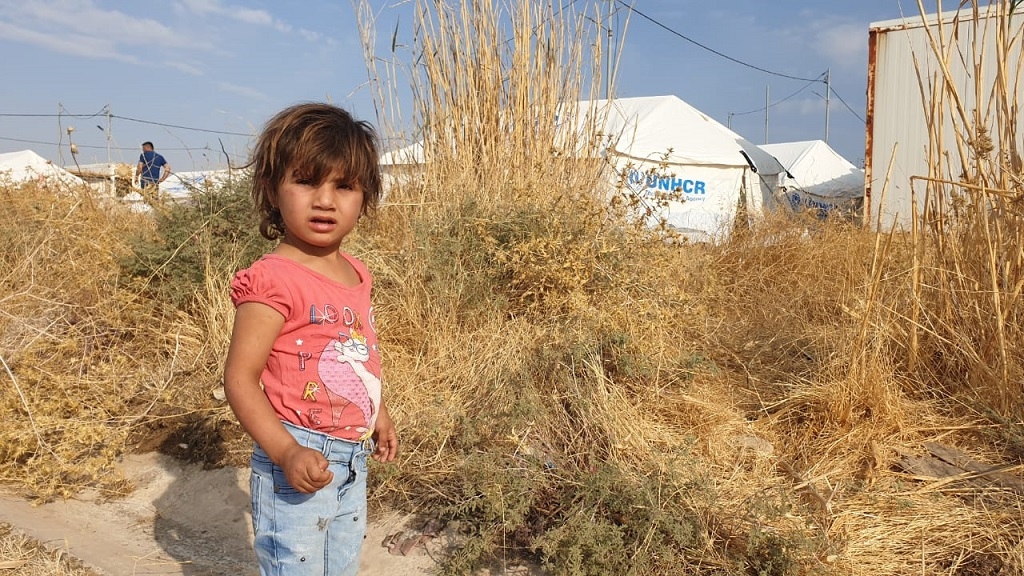
Displaced civilians on the run from an uncertain future in northeastern Syria say they were initially prevented from seeking safe haven in the Kurdish region of Iraq.
“They did not allow us to cross the border,” said one refugee whose family arrived in Iraqi Kurdistan with the help of a smuggler this week. “We were forced to come by other illegal means.”
'One-hundred percent of the refugees are coming illegally. They are coming after 9 o’clock at night. They paid to cross'
- Dilshad Ali, Barzani Charity Foundation
Last Thursday, just over a week into Turkey’s long-planned military incursion into northeast Syria, Ankara agreed to a five-day pause in the fighting during which the US will facilitate the withdrawal of YPG fighters from a 32-kilometre buffer zone along the border.
Among many unanswered questions is what this means for the tens of thousands of Syrians living in the zone Turkey intends to effectively occupy and whether the region should brace for another wave of displacement.
Since Turkey launched its operation on 9 October, the United Nations estimates more than 160,000 Syrians, including 70,000 children, have fled the air strikes and heavy shelling on their towns. The Syrian Observatory for Human Rights, a UK-based war monitor and activist group, said as many as 300,000 civilians are displaced.
New MEE newsletter: Jerusalem Dispatch
Sign up to get the latest insights and analysis on Israel-Palestine, alongside Turkey Unpacked and other MEE newsletters
Senior officials with the Kurdistan Regional Government (KRG) told MEE all of the displaced are welcome to cross the border. But on condition of anonymity, multiple aid workers in the region say the Kurdish internal security forces known as the Asayish are telling some civilians they need special permission to enter.
“They tell them that they cannot cross the border because the other side isn’t allowing them to,” said one aid worker.
“At the border, civilians can’t say ‘we want to go to Iraqi Kurdistan,’” said another. “They need a sponsor on [the Iraqi] side or to go for a medical reason.”
As of Sunday, the KRG said it had registered more than 4,000 refugees. The Ministry of Interior declined to say how many of those refugees arrived at unofficial ports of entry.
But a spokesperson for the Barzani Charity Foundation, the NGO tasked with receiving refugees at the border, said he’s so far only encountered Syrians who came through illegal means.
“One-hundred percent of the refugees are coming illegally,” said Dilshad Ali. “They are coming after 9 o’clock at night. They paid to cross.”
A Syria-focused researcher with contacts in the country’s northeast, who spoke on condition of anonymity for fear of losing access to the KRG, said smugglers are charging a minimum of $700 per person.
“If the border was open, [smugglers] would not be able to make a single dollar,” said the researcher. “People would just cross.”
“People know there’s no point in showing up to the border unless you have the sponsorship and have arranged the papers beforehand.”
Another factor driving unauthorised border crossings among young men: compulsory military service in the autonomous administration’s Self Defense Forces.
“If they catch me on the border they will take me to the military service,” said a 28-year-old resident who has so far managed to avoid conscription by using a fake identity card.
New wave of refugees
A surge in refugees would further strain the KRG’s capacity to provide for the more than one million refugees and internally displaced Iraqis already living within its borders. Of that group, 250,000 are Syrians, most of whom are Kurdish and arrived between 2012 and 2013.
Aid agencies are working overtime to move new arrivals into Bardarash, a camp northeast of Mosul that originally housed displaced Iraqis fleeing the Islamic State (IS) group.
“The time frame is concerning,” said Tom Peyre-Costa, spokesperson for the Norwegian Refugee Council in Iraq. “It takes time to set up such a big response because we are expecting more and more refugees to arrive.”
'To leave this solely with the KRG will be a disaster. Frankly, there has been no discussion of any kind with the US on this matter'
- Dindar Zebari, KRG coordinator for international advocacy
The KRG says it spends $1.9bn annually to provide housing and basic services to its displaced population. At the same time, donor government contributions for IDPs and refugees in the region is down by 50 percent, according to an internal document prepared by the Ministry of Interior and reviewed by MEE.
Kurdish officials have publicly and privately stressed the need for foreign governments to pick up the slack.
“It’s Europe’s responsibility to help,” said Diyar Amin, a KRG diplomat in Brussels.
“We’re keeping these Syrian refugees so they don’t go to Europe. They’ve been treated as first class citizens, and that’s what keeps many [in Iraq].”
“To leave this solely with the KRG will be a disaster,” said Dindar Zebari, KRG coordinator for international advocacy. “Frankly, there has been no discussion of any kind with the US on this matter.”
Asked for comment, a US Department of State spokesperson said humanitarian partners in Iraq hadn’t yet communicated the need for additional funding, but added the US “stands ready to respond if and when they do".
Running from Damascus
On 13 October, in exchange for protection from Turkish forces, the Kurdish-led Syrian Democratic Forces (SDF) said they had struck a deal with the government of Syria's President Bashar al-Assad that would allow for the return of Syrian troops to northeast Syria.
While the long-term implications of the arrangement are unclear, many activists, journalists and army-aged men fear what the presence of pro-government forces in the region means for their personal safety.
“I know the consequences if I stay,” said Russell, a man from Qamishli who requested that MEE refer to him only by his nickname.
In areas back under government control elsewhere in the Syria, rights groups have documented arbitrary arrests, forced recruitment, and torture in Assad’s notorious prisons. Sixty-three percent of returnees are actively seeking a way to flee again, according to a recent report from the Syrian Association for Citizen’s Dignity.
Russell paid an SDF soldier $1,000 to take him by motorcycle to a village near the Syria-Iraqi border. From there, the pair plans to take a car to a safe house, before walking the last stretch to the northern Iraqi city of Dohuk.
“It was a hard decision to make,” Russell said of leaving his life in Syria behind. “But what future is there under the Assad regime?”
Middle East Eye delivers independent and unrivalled coverage and analysis of the Middle East, North Africa and beyond. To learn more about republishing this content and the associated fees, please fill out this form. More about MEE can be found here.



